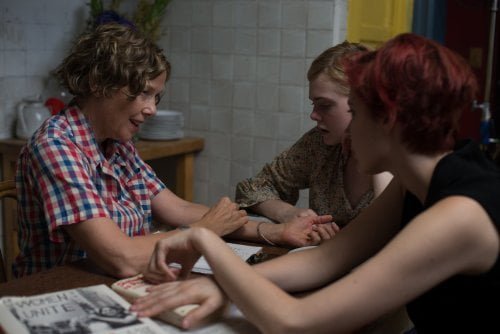20th Century Women

Dorothea Fields (Annette Bening) is a middle-aged single mom living a Bohemian life in Santa Barbara. It is the summer of 1979, a time of great upheaval, and Dorothea, overwhelmed by changes in art, politics and technology, is trying to provide a solid foundation for her teenaged son Jamie (Lucas Jade Zumann, "Sinister 2"). The handyman for her sprawling, run down home, William (Billy Crudup), provides some male guidance, but Dorothea turns to her punk rock roomer Abbie (Greta Gerwig) and the GenX neighbor Julie (Elle Fanning) her son has a serious crush on and asks them to help her raise him in "20th Century Women."
Laura's Review: B
After using his father for inspiration in "Beginners," writer/director Mike Mills turns to his mother, a woman both he and his teenaged protagonist found a mystery. His screenplay, rich in the details of a turbulent time as experienced by two generations, is unfortunately undercut by some fanciful directorial choices which don't always make sense. But this heartfelt film features a great ensemble cast delivering moments both hilarious and heartbreaking with real introspection and Mills successfully transports us into a different time and place. The film begins with the end of an era as Jamie's dad's Ford Fairlane erupts into flames in a supermarket parking lot. Dorothea responds in her inimitable way, inviting the firefighters to her birthday dinner and wondering how she can barter for new transportation. The Birkenstock clad Salem chain smoker ('because they're healthier') begins each day with her son entering her stocks' prices into a ledger. Sometimes she writes notes to her son's school excusing him from attending classes for such reasons as 'helping the Sandinistas.' Jamie, who spends most of his time with Julie (she crawls into his bedroom window at night, but their relationship is, to his awkward consternation, chaste), seems well adjusted, but Dorothea, a child of the Depression, is concerned she doesn't have a broad enough outlook to offer him. Transplanted NYC photographer Abbie opens Jamie's eyes to punk rock and feminism while Julie acts more like a bridge between mother and son. Dorothea marvels at how Abbie sees her son 'out in the world,' and affectionately admonishes Julie for not being a therapist despite having grown up with her mother's group sessions (Julie's diagnosis - Dorothea, who shuns the dating world, is attracted only to William but won't act on it because he's inappropriate). There are so many memorable scenes, from Dorothea and William sampling Black Flag and Talking Heads after Jamie's called an 'art fag' to Jamie's awkward embrace of feminism which alienates Dorothea after he reads her a piece on aging women (and gets him into a fight over how to please a woman sexually). The entire household gathers to watch Jimmy Carter's 'crisis of confidence' speech, a bittersweet reminder of presidential reflection in an age of materialism. Mills works several angles of motherhood and mortality into his script as well. Abbie is a cervical cancer survivor who cannot have children, the result of her mother having taken DES. Julie has a pregnancy scare. Jamie scares his mother half to death when he almost dies playing a hyperventilation fainting game but she has no response when he asks 'Why do you smoke yourself to death?' Bening slips right into the skin of this open minded woman caught between generational mores and shares a real sexual spark with the compassionate yet passive Crudup. Gerwig flits between joyous embrace of the now and sad regret for her future. Fanning is also strong, a precocious teen who dabbles in sex but keeps her best friend out of the running, a confused mix of feminist and flirt. Everything from Dorothea's Santa Barbara home to a soundtrack which features The Raincoats, Siouxsie and the Banshees and David Bowie pulls us back to another era. But Mills uses psychedelic flourishes which work once, during a drug reference, only to reappear for no seeming reason, just like the dropped frame editing sprinkled in randomly. His 1999 set epilogue, in which Jamie reveals what happened to everyone, is poignant, but once again Mills goes a too far, a remembrance of Dorothea too whimsical by half. These extraneous embellishments may momentarily knock us out his film, but it is otherwise so rooted in truth its his characters and words we remember. Grade:

